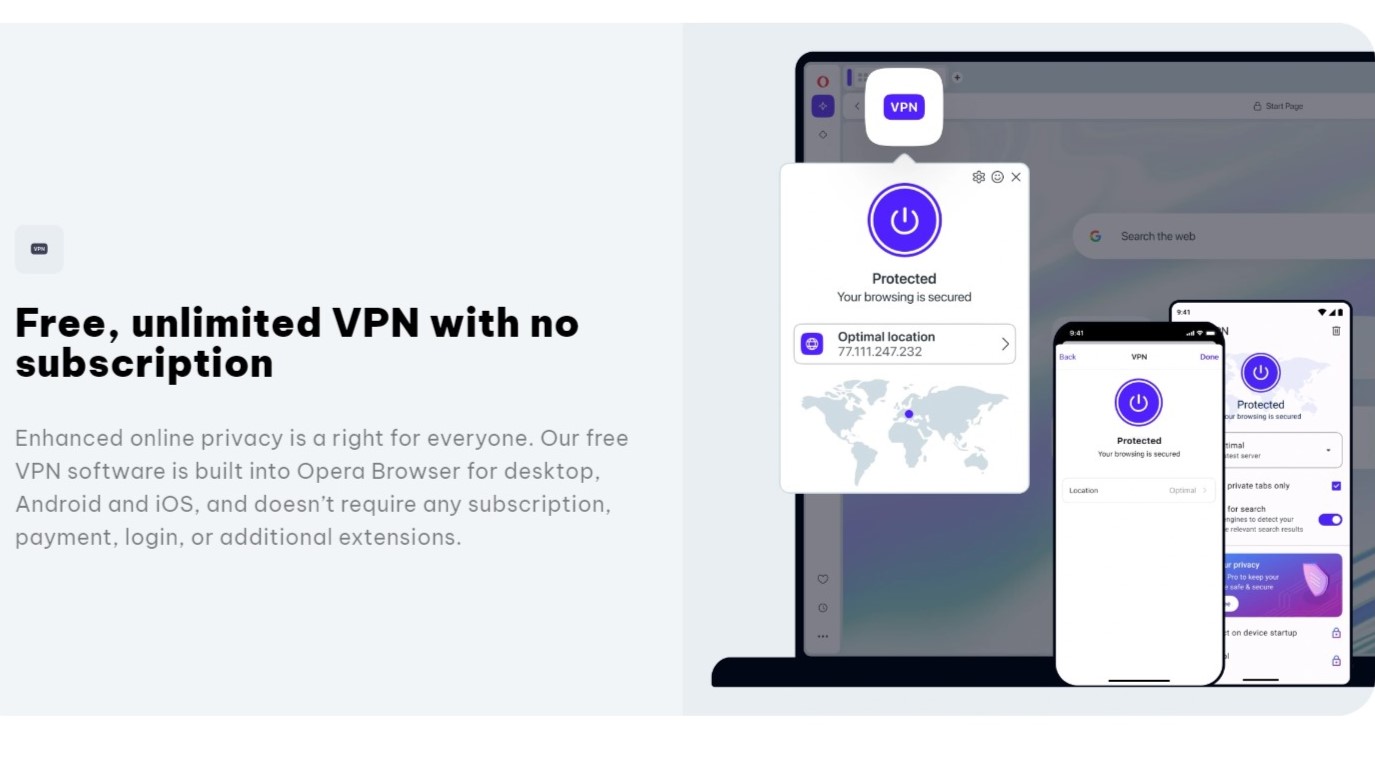OperaVPN never logs your activities, independent auditors confirm
Opera VPN is built directly into the browser apps and doesn't require registration

Independent auditors have confirmed that Opera's free VPN never logs what you do online. This is especially great considering that the security tool comes built into one of the best web browsers on the market.
Security experts at leading cybersecurity auditing firm Deloitte inspected Opera VPN's technical infrastructure to ensure users' data linked to their activities is never stored or logged as stated on Opera's no-log policy. Auditors did not identify any instances of non-compliance.
"The audit reaffirms our commitment to protecting user privacy by certifying that your data is never logged or stored when you use our free VPN," Jan Standal, VP at Opera, told me. "We have had a no-log policy since we launched the service in 2016. Since then it has become the norm for major VPN providers to do third-party audits as part of their transparency commitment."
We’re excited to announce that we completed an independent audit of our no-log policy for our free browser VPN, conducted by Deloitte! The audit reaffirms our commitment to protecting user privacy by certifying that your data is never logged or stored when you use our free VPN. pic.twitter.com/BDrsWtC5InSeptember 25, 2024
Deloitte spent time thoroughly reviewing the controls in place and the technical configuration of the system and VPN infrastructure. It did the same with Opera's internal documentation, policies, and procedures.
After careful consideration, experts could confirm that Opera VPN respects the company's strict no-log policy.
While also offering a premium version, the free virtual private network tool comes directly integrated into the Opera browser apps for desktop, Android, and iOS. This means you don't need to download any extra apps or extensions to start browsing more privately. Even better, Opera VPN doesn't require any registration, so you can use it completely anonymously.
The importance of no-log VPNs
As a privacy expert, I particularly value a strict no-log policy when I assess any VPN software – even better when this is regularly independently audited. Such a feature is especially crucial if the main reason you're using a virtual private network in the first place is boosting your privacy.
As mentioned earlier, a no-log VPN ensures that none of your personal data is ever recorded. So, while some logs, like the number of users connecting to the same server and the email address associated with a user's account, are inevitable as they are necessary for the software to work properly, a no-log policy is your guarantee that no data linked to you or your activities is ever collected.
This is very advantageous for a few reasons. For example, if a hacker manages to compromise your VPN account or provider, there will be almost no sensitive data that could be compromised. The same goes if authorities ordered the company to disclose users' data. These details simply won't exist.
The importance of this feature has already been proved in real life on a few occasions. In 2019, Proton was unable to help authorities identify a Proton VPN user as they didn't store any identifiable information. More recently, Swedish authorities were left empty-handed after an inconclusive police raid on Mullvad's servers last year.
Now, you can be sure that also when using Opera VPN, everything you do online will remain as private as it can be.
Disclaimer
We test and review VPN services in the context of legal recreational uses. For example:
1. Accessing a service from another country (subject to the terms and conditions of that service).
2. Protecting your online security and strengthening your online privacy when abroad.
We do not support or condone the illegal or malicious use of VPN services. Consuming pirated content that is paid-for is neither endorsed nor approved by Future Publishing.

Chiara is a multimedia journalist committed to covering stories to help promote the rights and denounce the abuses of the digital side of life – wherever cybersecurity, markets, and politics tangle up. She believes an open, uncensored, and private internet is a basic human need and wants to use her knowledge of VPNs to help readers take back control. She writes news, interviews, and analysis on data privacy, online censorship, digital rights, tech policies, and security software, with a special focus on VPNs, for TechRadar and TechRadar Pro. Got a story, tip-off, or something tech-interesting to say? Reach out to chiara.castro@futurenet.com